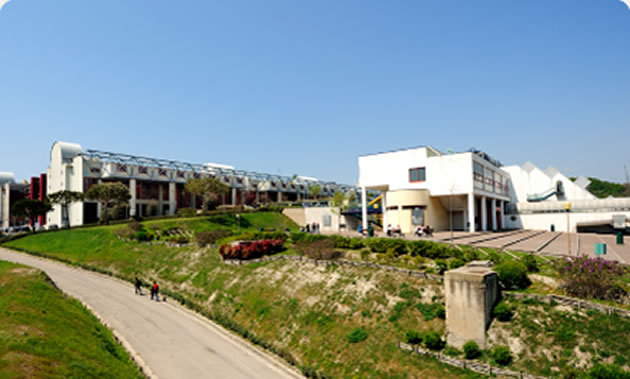Mechanistic studies on olefin polymerization catalysts
Along with the SPR studies, we cultivate fundamental investigations on the mechanisms of catalytic olefin polymerizations, aiming to identify the origin of the observed stereo-, regio- and chemo-selectivities for heterogeneous as well as molecular systems, and the dominant chain transfer pathways presiding over their polymer molecular weight capability. We typically do that by combining molecular kinetic observations with in-depth NMR polymer microstructure analyses. A recent example is the elucidation of the subtle effects governing tandem molecular catalysis under reversible trans-alkylation (“chain shuttling”) regime.
Olefin polymerisation catalysts: when perfection is not enough. Dalton Trans. 2015, 44, 12304-12311
Molecular Kinetic Study of “Chain Shuttling” Olefin Copolymerization. ACS Catalysis 2018, 8, 5051-5061
Purely computational tools can be exploited to model the elementary reaction steps of the polymerization process when the structure of the active species can be assumed to be known. At LSP we have carried out a solid benchmark of DFT protocols for modelling various reactions of interest in olefin polymerization, from simple olefin insertion to metal-carbon bond homolysis. Thanks to the so- optimized approach, accuracy needed not only for mechanistic understanding but also for reliable kinetic modelling has been achieved. This has been proven, for instance, by the successful modelling of comonomer affinities in ethene/α-olefin copolymerization.
Catalyst activation and the dimerization energy of alkylaluminium compounds. J. Organomet. Chem. 2014,772–773, 161-171
Calculating accurate barriers for olefin insertion and related reactions. J. Organomet. Chem. 2015, 775, 39- 49
Metal–carbon bond strengths under polymerization conditions: 2,1-insertion as a catalyst stress test. J. Catal.2017, 351, 146-152
Accurate Prediction of Copolymerization Statistics in Molecular Olefin Polymerization Catalysis: The Role of Entropic, Electronic, and Steric Effects in Catalyst Comonomer Affinity. ACS Catalysis 2017, 7, 1512-1519
Backbone rearrangement during olefin capture as the rate limiting step in molecular olefin polymerization catalysis and its effect on comonomer affinity. J. Polym. Sci. A: Polym. Chem. 2017, 55, 2807-2814.
From Mechanistic Investigation to Quantitative Prediction: Kinetics of Homogeneous Transition Metal- Catalyzed α-Olefin Polymerization Predicted by Computational Chemistry. In Computational Quantum Chemistry, Soroush, M., Ed. Elsevier: 2019; pp 287-326.
More often, experimental and computational tools are combined in highly integrated studies. This is almost invariably the case for heterogeneous catalyst systems (e.g. of Ziegler-Natta type). Recent successful examples in molecular catalysis concern the correlations between structure and properties of octahedral bis(phenolate-ether) ‘post-metallocenes’, as well as the identification of unprecedented pathways of chain transfer to solvent and to monomer.
Chain Transfer to Solvent in Propene Polymerization with Ti Cp-phosphinimide Catalysts: Evidence for Chain Termination via Ti–C Bond Homolysis. ACS Catal. 2016, 6, 7989-7993
Catalyst Mileage in Olefin Polymerization: The Peculiar Role of Toluene. Organometallics 2018, 37, 2872-2879
Leading to Benzyl and “Dormant” Titanium Allyl Complexes. Organometallics 2018, 37 (22), 4189-4194
Formation and Activation of Zr/Hf Bis(phenolate-ether) Precatalysts Eur. J. Inorg. Chem. 2019, 3396-3410
Structure-Activity Relationships for Bis(phenolate-ether) Zr/Hf Propene Polymerization Catalysts. Eur. J. Inorg. Chem. 2020, 541-550
Furthermore, LSP has a long-standing tradition in investigating the complex cross reactivity of precatalysts and cocatalysts (activators). Recently, especially interesting results have been obtained on the structure and reactivity of methylaluminoxane (MAO) and some modifications thereof, by successfully integrating DFT modelling and advanced NMR spectroscopy (in collaboration with the research group of Prof. Alceo Macchioni at the University of Perugia).
BHT-Modified MAO: Cage Size Estimation, Chemical Counting of Strongly Acidic Al Sites, and Activation of a Ti-Phosphinimide Precatalyst. ACS Catal. 2019, 9, 2996-3010
On the nature of the Lewis acidic sites in ‘TMA-free’ phenol-modified Methylaluminoxane. Eur. J. Inorg. Chem. 2020, 1088-1095
Reactivity Trends of Lewis Acidic Sites in Methylaluminoxane and Some of Its Modifications. Inorg. Chem. 2020, 59, 5751−5759

Introduction
LSP is a global competence center for fundamental and applied studies on olefin polymerization chemistry and catalysis.

Members
We hope you Enjoy discovering all the people that belong to the LSP Project. Visit us to discover more about our team.

Research
LSP specializes in fundamental and applied studies of catalytic olefin polymerizations, aiming to better understand and improve…

Infrastructure
LSP is one of the very few academic groups operating a comprehensive HTE workflow for organometallic catalysis.

Join LSP!
We are always interested in hearing from potential new members and collaborators who are interested in a position at LSP.

Visit
Whether you are a student, a scientist, a technologist, or an occasional traveler of the Web, visit us, get in touch.




